It's Not My Revolution if Nobody Does the Dishes
Duck shit, collective care, and functional anarchism in a time of increasing heat and violence
After many days of tightly scheduled labor –sowing seeds on the slick earth in thunderstorms, scything lanes for travel through the rank and dewy pastures, harvesting berries, and hauling creaking cartloads of grass mulch from point to point along the steaming summer prairie pastures that radiating with the heat of fly-buzz– I have finally sat down to write. Before my butt hit the chair, out here in what could be called my temporarily shady outdoor office, east of a hot breeze filtered through the flapping leaves of an old Osage orange fence line, I was stung just below the right nipple by paper wasp. I suppose the mildly painful incident should serve as a warning– but for what, I’m not yet sure.
The natural world offers human beings quite a bit of guidance this way. The fine spines of dewberry brambles and stout thorns of wild blackberry exhort restraint in our harvest, allowing other berry eaters on the land a chance to snack. Poison ivy halts the treading of human beings into the sheltered confines of wooded draws and river-bottoms in the times that fawns and raccoon kits are most vulnerable. There is no moralizing on the subject of trespass and greed, merely painful correction. Eating and harvesting and grazing and profiting from plants requires existing in their preferred environment, and on their terms. Without a shared soil and climate, we cannot easily negotiate an equitable contract with our crops– that’s why I hate hydroponics.
Anyhow, I’m doing my best to work it out with our co-residents here on the land. I accept feedback by running away from flying, stinging things, nurture dirt and aid in propagation of the native flora, and do my best to maintain a strict truce with predatory animals, with the exception of squash bugs and Japanese beetles. I know it probably isn’t scientifically sound to personify my surroundings this way, but I do believe that humans learn from stories, and if we can tell each other enough of the right stories about our environment, we might approach it with more care. So as my nipple throbs with a sharp and sustained pain –which I do not find enjoyable– I think the warning I’ve been given by my wasp neighbor is to tell the right stories, or at least honest ones.
Yesterday was the longest day of the year on our side of things, and today isn’t too short either. I am shifting to a more crepuscular workflow, rising with the robins that flit between the branches of mulberry, swollen with bloody fruit, mixing and hauling feed to our poultry and pigs as the first long, hot rays of light singe the seed-laden tops of early grasses. A very weathered hen duck, Francois (our third Francois– we always name our white-colored brood hens Francois), peeks out from wherever she’s secretly laying eggs and follows me for the initial mixing and loading, dragging her plump, stained breast through the abundance of mulberries that lay along the hedgerow, demanding her breakfast of sprouted corn before returning to the receding shade to nibble fallen fruit and speckle the understory with impressive –if not revolting– purple puddles of duck shit.
As the bright heat begins to burn over the current cattle paddock, the cows are already stomping and tail swatting among the pasture flies. The nearby barn-swallows and kingbirds and least flycatchers dart in the haze and wind, consuming a few of the ceaseless legions of the Diptera order. After the earliest chores, I spend somewhere between twenty or thirty minutes mowing, and make an equal attempt weeding and watering the garden, before the sweat hits my eyes– which could be as early as 7:15 these days. The work will not cease, but perhaps it can slow a bit for the next few hours during this period of acclimation.
We have just weaned the wether goat kids from their mothers by moving them into a wooded draw thick with black locust, pin oak, and poison ivy alongside the other buck and buckling and a few yearling wethers– when they aren’t ruminating in the shade or browsing and exploring the thorn and vine, they bleat out of separation, confusion, and fear. It is important to check on them, regardless of the heat and brush when they do this. A homesick kid might test the portable electric netting and get tangled or worse. They may have tipped or fouled their water, or escaped. There is little to no time to throw on boots and pants, and so I often must tromp as carefully and quickly as I can through the ticky brambles and blistering kiss of poison ivy and wild parsnip.
More often than not, the goats are standing in a row against the fence in fine condition– only voicing their displeasure with the climate and arrangements. Any skin-contact with this defensive floral arrangement results in cuts, scrapes, or ticks in all circumstances, and weeping rashes, oozing boils, or microscopic infestations of chiggers if not immediately addressed. I wipe down with rubbing alcohol and rain-water as soon as possible, but it is inevitable that I will suffer through some malady of the flesh that renders my skin into some form of neo-dark age poxes and lesions.
If all goes well, I will return from the ceaseless task of livestock-husbandry mostly cleaned off and unscathed before Francois (the third) waddles her way to our kitchen construction site and vacates her bowels upon the new earthen floor –still slowly drying and sealing– with a dinner plate sized plop of hot, intestinal berry smoothie. If this weren’t a shared piece of infrastructure, I might consider working the purple duck shit into the smooth surface of clay, sand and linseed oil as some form of experimental colorant and sealant, but I’ve learned over the years of co-creating a largely functional non-hierarchical shared anarcho-utopian-solarpunk that things fall apart when nobody cleans shit up.
I suppose the kitchen is where the heartbeat of summer habitation resides– we certainly raised the timbers for it in that hard-to-find sweet spot between shade and airflow for a reason. It is a perfect place to relax and braid garlic, frantically cook for a dozen people, cuss out –and inevitably wash– other people’s dirty dishes, or defecate, if you are a duck or unattended toddler. This particular iteration of the cooperative kitchen is still a construction zone at the moment, built upon the ash and rubble of the one that burned to the ground some seasons ago. We hope to be in the new space almost any day now– but not this week or next probably.
In the meantime, as the kitchen project grows and lurches along the fence line –its twisting bones riven from oak and osage, waking like some tangled dream– we must make do with a dilapidated shed perched in the mud, heat and wind. If the new kitchen is summer’s heart, this is the over-taxed pacemaker keeping our collective alive. It is hot, cramped, and difficult to clean– a piece of shared infrastructure brought online in a time of disaster. The conditions are challenging– westerly storms sometimes have a way of passing through the entire kitchen vertically. The walls sometimes throb with colonies of native bees who –despite their cuddly reputation– will offer repeated and violent physical correction to the humans in their space. Sometimes the little solar array fails in the heat and the refrigerator goes warm, spoiling food. The life-blood of this project –the infrastructure of care and cooperation that has kept it alive for a decade– can sometimes be hard to excavate beneath the grime and flies and soot of a hundred-degree day. Like the paper wasp that got me earlier, humans are prone to stinging one another when it’s hot.
I wonder sometimes, what a hotter world is going to feel like. I think enough about how it will manifest physically– glaciers will melt, sea-levels will rise, major populations will become refugees or die, and more species of plants and animals will go extinct. These things are already guaranteed, even if industrial society collapses tomorrow. My concerns these days are with how it will feel– how angry we will get, and towards whom. Will we learn to cultivate patience? Will we, as a global human culture, move from apathy to despondence, when so much is at stake? Will we clean up after each other?
I believe that food helps, and food matters. I guess that’s why I continue to pursue it, despite how foolish I feel in that pursuit sometimes. It turns out I want more than an equitable price-per-pound on what I raise– I want folks to have my back, and occasionally wash my dishes. Our kitchen wouldn’t exist if people didn’t need it– if our survival wasn’t in some way linked or mutualized. Life on earth is about to get a whole lot more difficult for most of us, and we need to respond to that with more cooperation, more resource sharing, and more mutuality of survival in this age of DoorDash. Perhaps our culture is shattered in part because we aren’t responsible to a larger collective. Because we don’t eat together.
That being said, cooperation isn’t simple– but I do think it’s instinctual in humans. In order to cooperate, especially here in the US, there are layers of cultural conditioning around “freedom” and “independence” to shed. While diverse worldviews are important for the collective, there needs to be some shared baseline in vision or value. And perhaps most daunting, the keystone of successful cooperation –mutualized survival– is difficult to define and detect in a class-based society, where some folks do not need to work as hard as others for resource access.
In a paragraph, our kitchen cooperative operates something like this: Every member contributes what they can, according to their means, and gets fed. Some of us provide produce, construction labor, kitchen labor, or cash. We prioritize infrastructure and maintenance needs, develop a rough budget, and attempt to make collective income for it– often by being paid by our land trust’s non-profit to feed visitors and workshop attendees. Sometimes we can barter– I am currently exchanging chestnut and persimmon seedlings for an electrical consultation on our new PV solar system. We spend one hour a week scheduling work parties and cook shifts, updating each other briefly on how we’re doing, and making decisions by consensus. There is always clean drinking water, and there is always food– in all we provide meals and camaraderie for 10-12 adults and 2-4 kids from May through October, when we’re all too busy to cook more than one or two meals a week, and individual dwellings with indoor kitchens heat up from summer cooking and canning.
But for all the bread and roses and cooperation, we still get mad at each other. It’s hard to keep one’s cool when the temperature and humidity is a declarable health hazard. Tensions are at their highest in the heat, even here in the beating heart of our solarpunk utopia– this is what gives me pause for the hot, violent future ahead.
I do my best to stay cool, drink water, and not overexert myself in the heat of the day– one exception to this is the afternoon chores. My responsibility to my non-human comrades– the turkeys and chickens and ducks and swine, as well as the cows and goats (which are also managed cooperatively), requires steadfast care at the peak of the day’s heat– if the pigs run out of water at 2 pm (or more likely tip it), they are at risk of death by 5, at least under current conditions. And so, when the sun burns and the air hangs heavy like a fat, panting sow, I work to ensure the health and safety of my herd. Everybody eats, and everybody drinks– the infrastructure of care ticks along, even in the insufferable heat.
In the shade and mud beneath thick, dense clumps of elderberries, hen ducks nurture their fuzzy offspring, dabbling their bills and nudging mulberries, worms, and detritus towards the ducklings. The damp earth is speckled with a hot snow of elder-blow that drifts down from the buzzing umbrels. I do my best to approach with a full waterer and some starter feed as the protective mothers hiss and charge at me, protective of their young, so I place them as close into the shade as I can and traipse away quickly before I’m attacked. The cattle take shifts at their water trough, the heifers drinking deeply before nudging their big babies on the neck on their return to the dappled shade of honey locusts. But the pigs, well, they act pretty close to humans– grunting at the trough, wrestling against each other for scraps, or greedily denying access to the waller, slick with mud and freckled with elder-blow. A lot of folks think pigs are too similar to humans to eat, but I’ve come around to the consideration that humans are close enough to swine to suggest cannibalism is perhaps more ethically ambiguous than our cherished moral authorities have claimed.
Still, despite the wasp-stings and tussling and petty grievances that grow toilsome and annoying here beneath the heat dome, I’m largely alive, and only partially afflicted by the prairie pox. As the world grows hot and violent, as the safety net tears and communities crumble and the US finds new and creative ways to find the money to murder people for the prosperity of a dwindling few, it’s easy to want to make a big, sweeping change. And while I wouldn’t kick a revolution out my bed if I woke up to it tomorrow, it’s probably the strategic choice to first relearn how to cooperate– not just for a fun project, but when things are hot, miserable, and unsafe. A revolution tomorrow doesn’t guarantee a meal the day after.
Every evening, May through October, the old school-bell in our kitchen belfry clangs a few times, ten minutes before dinner, allowing folks to come in from the day’s work, wash up a bit, and eat. This evening, the floor is clean of duck shit, and our bellies are empty and ready for whatever awaits them– hopefully something good. In the hedgerow shade, my sweat dries, and the fat robins rustle in the mulberry trees, Francois standing patiently below, waiting for them to drop treats. It’s too hot for hand-holding, giving gratitude, or other “kumbaya” type activities, so we just plate ourselves up and take a seat. It is another evening in our little corner of hell on earth, and everybody here got fed.
I’ve probably left four or five dirty plates out this past week, likely distracted by some malfunction in the irrigation line or a bleating goat or some damned thing, and so to keep things equitable, I sneak in to wash a few extra dishes. The air has cooled from an “Excessive Heat Warning” to a mere “Heat Advisory” for the short evening hours, and the haze down along the slope is just beginning to flicker with fireflies. At first, there are only a few neon sparks, crackling in the ghostly condensation, but gradually, they freckle the darkening banner of night with luminous intensity, like the thickening carpets of elderblow across the hot prairie mud. I wasn’t certain that we’d be seeing so many of them this year– I’ve heard many casual observations at the feed mill and the cafe that they weren’t showing up for everybody this year, but as surely as I’ll eat tomorrow, they’re still here, for now.


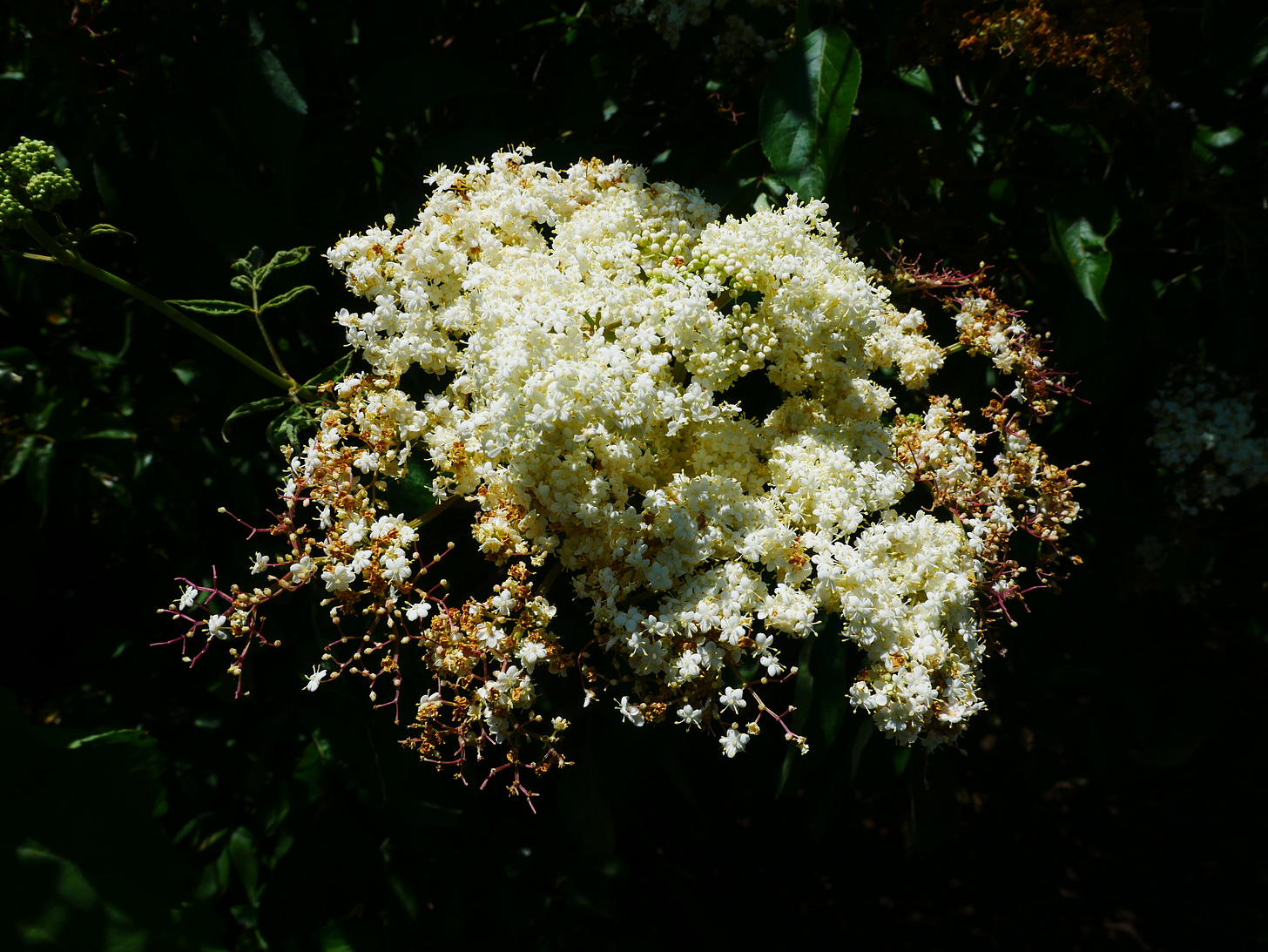
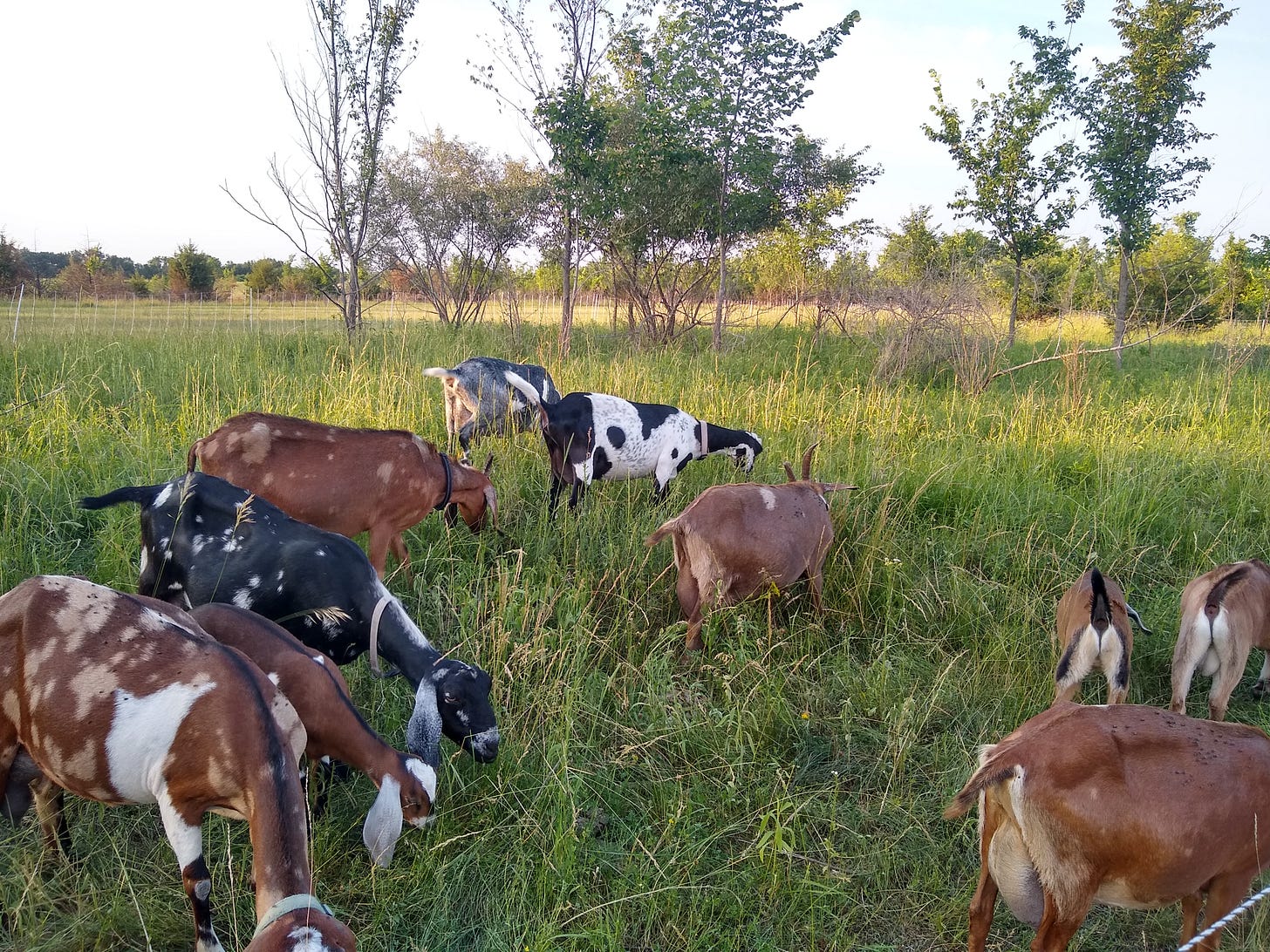
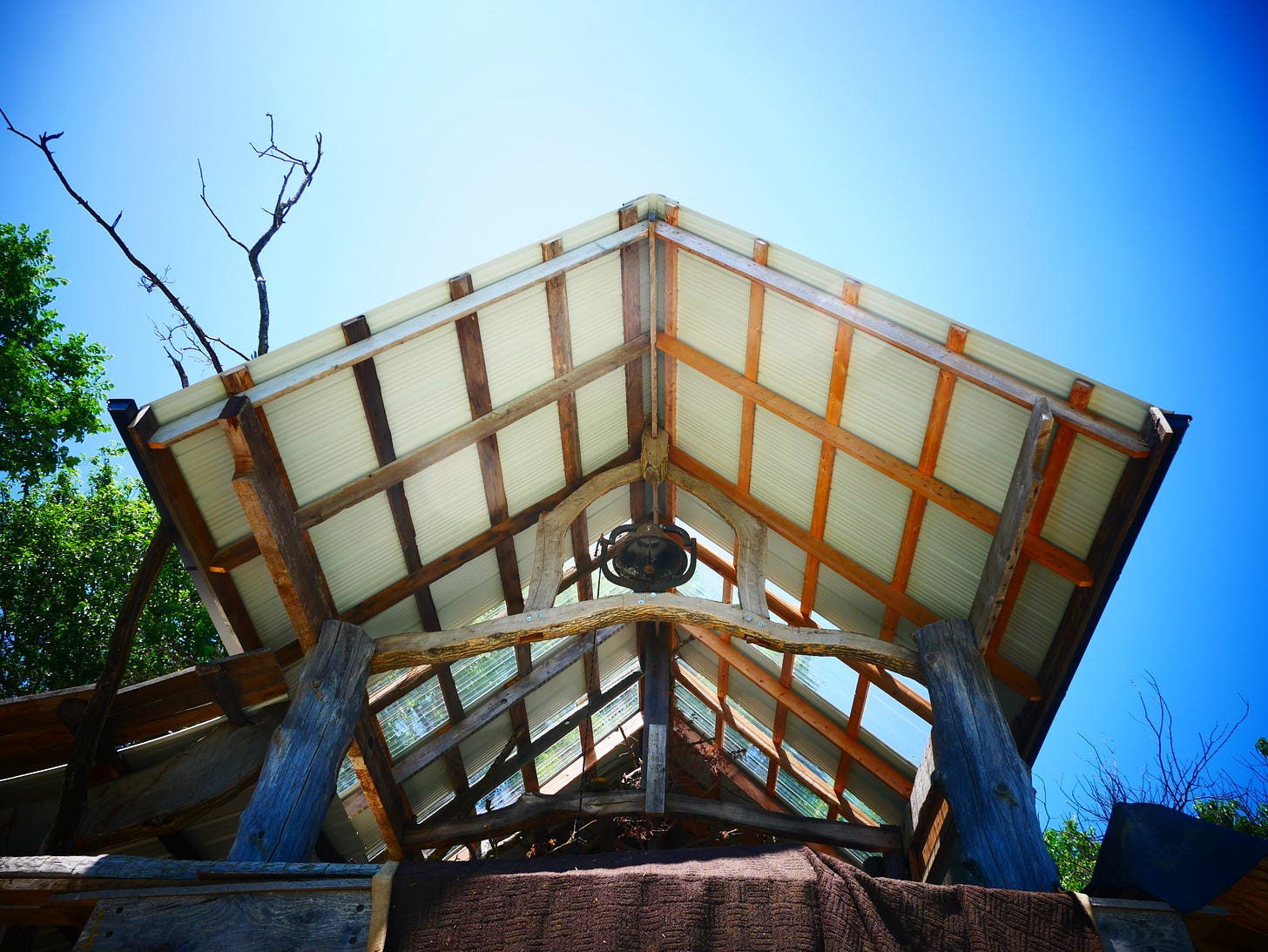
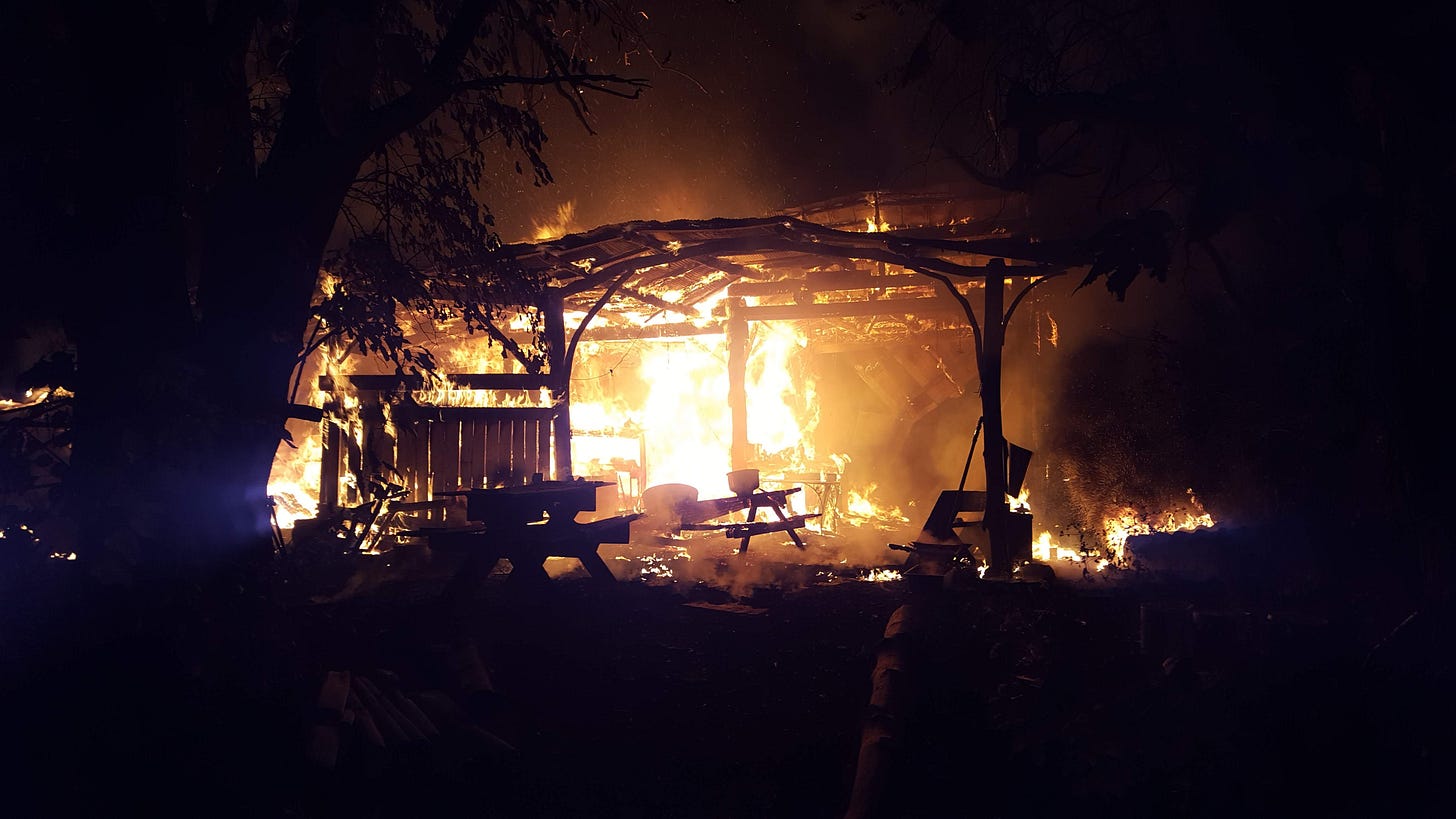
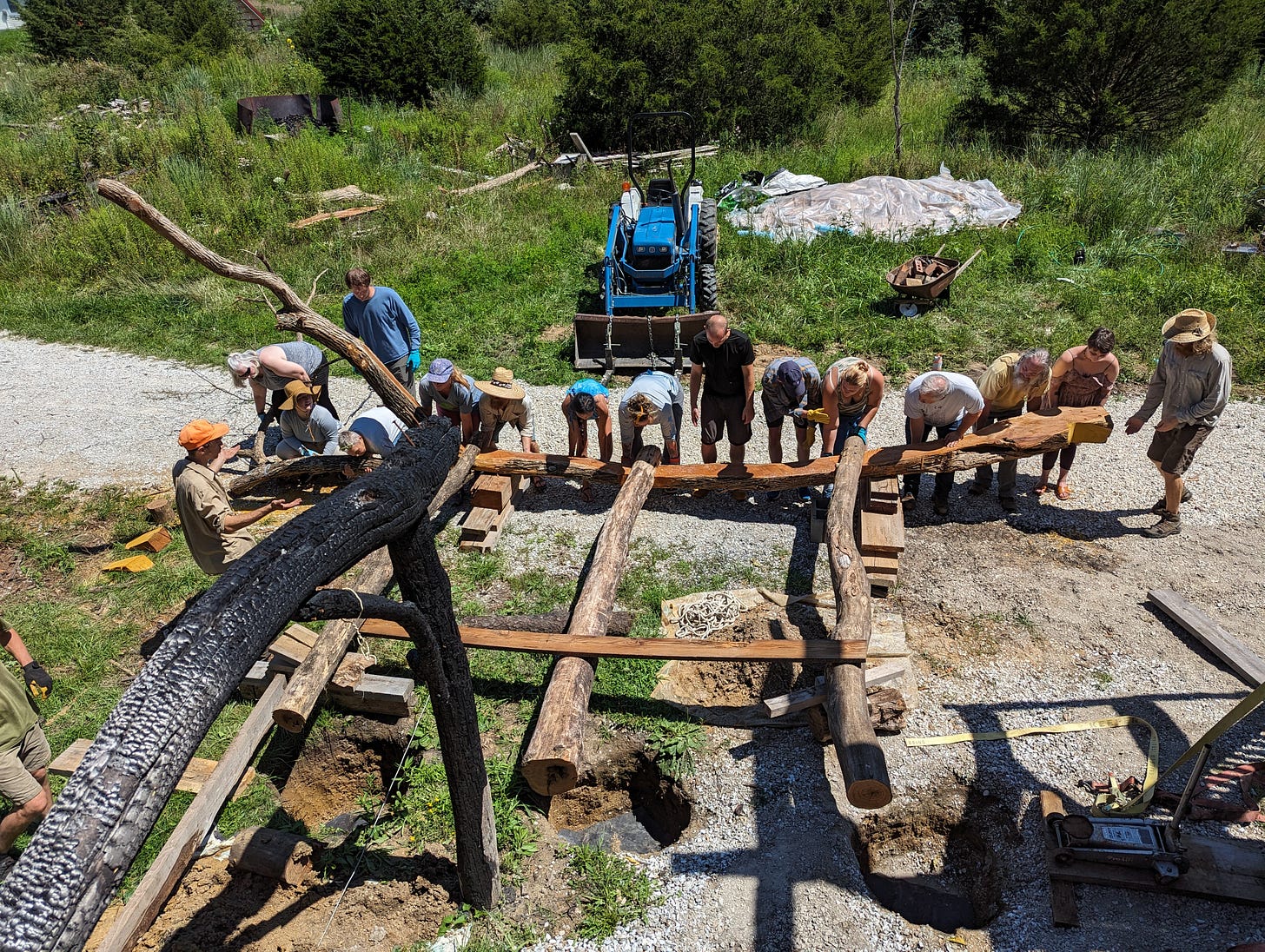
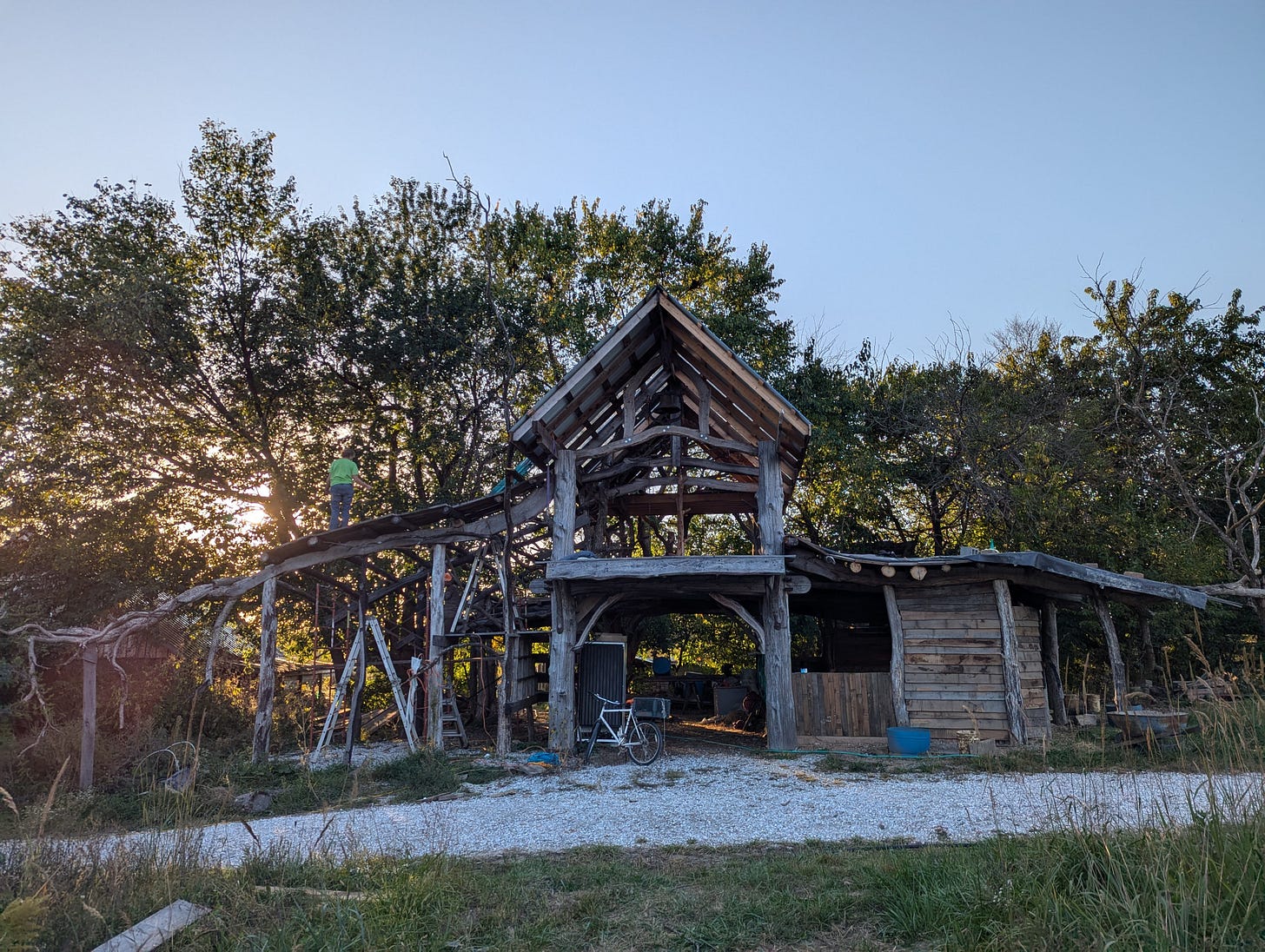
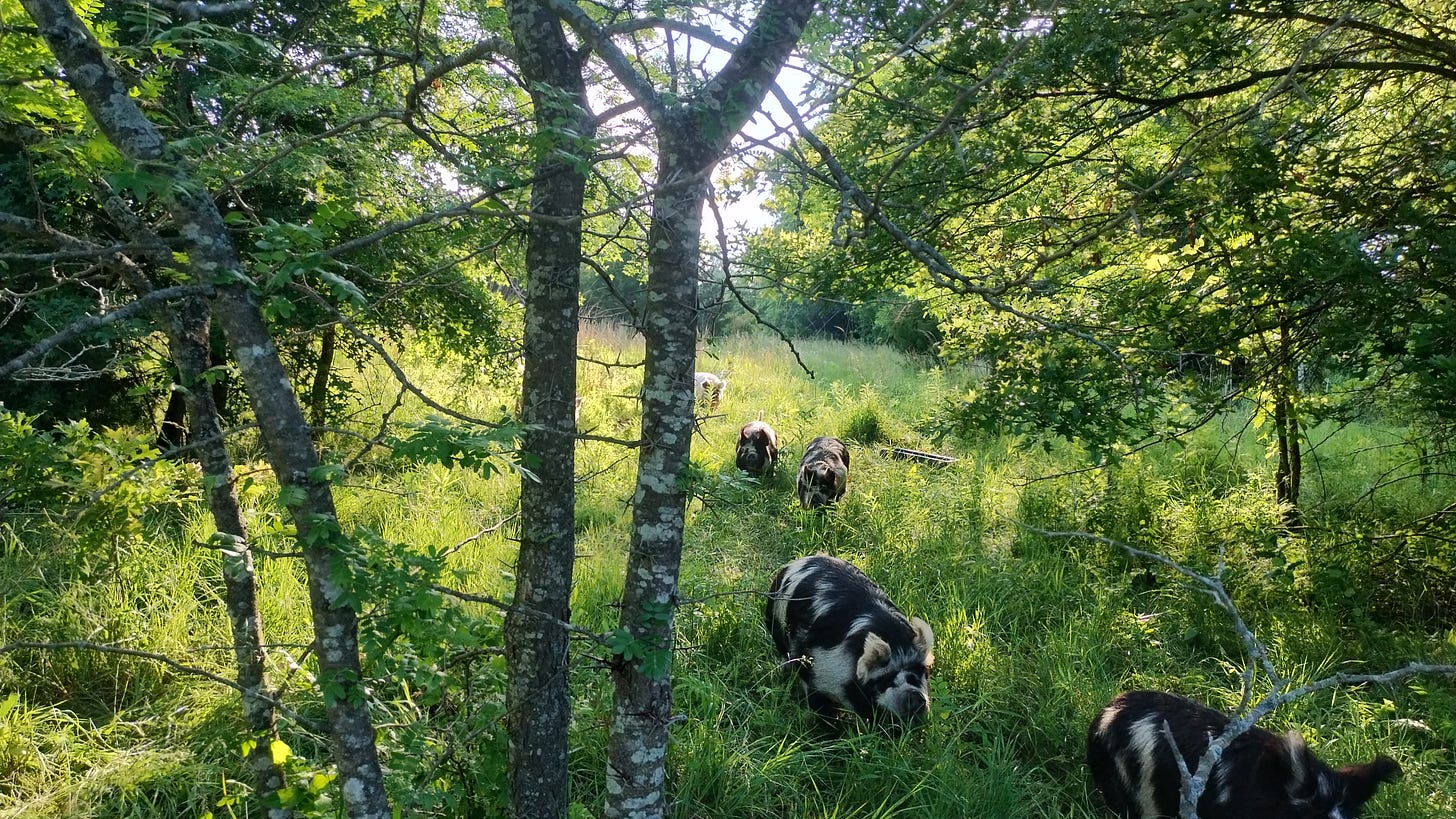
love this whole piece, the line "A revolution tomorrow doesn’t guarantee a meal the day after" in particular really resonated with me, that idea of building of systems of care, collaboration, and survival so that we have capacity to handle these tasks as things fall apart. thank you for this offering
Wise words: “I’ve learned over the years of co-creating a largely functional non-hierarchical shared anarcho-utopian-solarpunk that things fall apart when nobody cleans shit up.”
Great piece, thanks.